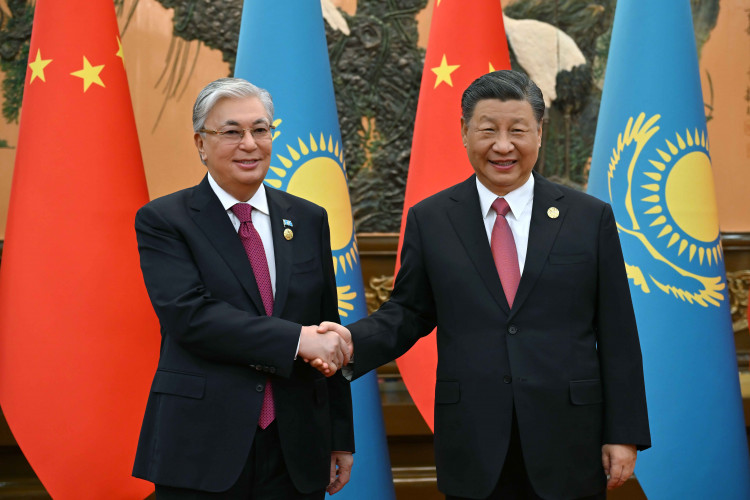ASTANA — The Shanghai Cooperation Organization (SCO) Summit participants will urge the international community to initiate an honest and open global dialogue, adopt a new security paradigm, create a fair economic environment, and take the necessary steps to maintain the planet’s cleanliness, President Kassym-Jomart Tokayev said in an interview with Xinhua on July 1.

President Kassym-Jomart Tokayev with President Xi Jinping. Photo credit: Akorda
During the interview, Tokayev focused on the relationship between Kazakhstan and China, which is based on “strong bonds of friendship, shared history, and good neighborliness.”
He also mentioned President Xi Jinping’s statе visit to Kazakhstan in 2022, which launched a new “golden 30th anniversary” of bilateral cooperation.
“It is gratifying that the first foreign visit of the Chinese leader after the pandemic took place in Astana. This once again confirms the importance of relations with Kazakhstan in Beijing’s foreign policy,” Tokayev said.
Priority areas for the Kazakh-Chinese partnership
In the interview, Tokayev expressed his support for China’s Belt and Road Initiative (BRI) and praised Xi Jinping’s concept of a community with a common destiny for humankind, which in the current international situation is gaining new relevance and is designed to promote the formation of an equal and multipolar world.
He also reiterated joint ambitious plans to deepen multifaceted relations and increase mutual trade turnover to $100 billion.
“Considering the powerful foundation we have laid over 32 years of effective bilateral cooperation, Kazakhstan is ready to make every effort to strengthen good neighborly relations, intensify exchanges, and deepen practical interaction,” he said, highlighting five key areas of partnership.
According to Tokayev, both countries should pay particular attention to investments, notably in agriculture, new energy, the automotive industry, industrialization, and the production of high-value-added products.
Kazakhstan and China need to increase trade turnover, diversify their trade structures, and widen the range of goods they trade using modern tools such as e-commerce and electronic trading platforms.
This year marks the beginning of the next decade of the BRI, and Kazakhstan sees it as a crucial moment to strengthen the country’s role as a key and indispensable participant in this mega-initiative, as well as a reliable Eurasian transport and central logistics hub of the BRI, said the President.
“At the same time, our maximum focus will be on the active use of the capabilities of the Lianyungang port, the dry port in Xian, and the Khorgos – Eastern Gate special economic zone,” he said.
Transport cooperation and cultural ties
Expanding transport cooperation between the two countries is another priority for Kazakhstan, which continues the construction of second tracks on the Dostyk-Moiynty railway section. In addition, the sides plan to construct a third railway checkpoint on the border.
Addressing the cultural and humanitarian sphere, Tokayev highlighted that the visa-free regime introduced by both countries, the opening of cultural centers, Lu Ban Workshops, and branches of universities, as well as efforts to increase flights, are significant steps towards strengthening mutual understanding and friendship between the peoples of both countries.
“It is safe to say that our countries are at the origins of great achievements and victories, which will undoubtedly unite us on the path to a bright future within the framework of the new ‘golden 30th anniversary’ of relations between Kazakhstan and China,” Tokayev said.
Kazakhstan’s priorities as SCO chair
In his interview, Tokayev also spoke about Kazakhstan’s role as chair of the SCO and the upcoming SCO Summit in Astana.
“The chairmanship of the SCO is a very important and highly responsible mission. As one of the founders of the organization and an active supporter of the development of multilateral dialogue, Kazakhstan considers the organization a permanent priority in its balanced foreign policy,” he said.
Kazakhstan’s efforts will aim to develop common approaches to solving security problems, strengthening trade and economic cooperation, promoting environmental protection, and reinforcing the friendship ties among SCO member states.
Tokayev said that strengthening the SCO’s international authority by expanding its contacts with major global and regional structures is one of the essential tasks. More than 150 events have already been held in New York, Beijing, Nairobi, and Moscow.
The upcoming SCO Summit in the Kazakh capital is expected to make important decisions to enhance the SCO, determine priority areas of interaction for the medium term, and develop initiatives to adequately and timely respond to current challenges and threats.
“Taking this opportunity, I would like to express my sincere gratitude to all SCO member states for supporting the initiatives of the Kazakh chairmanship, showing solidarity with our proposals, and collaborating in response to the goals we have set. We expect that the final decisions of the summit will fully embody the fundamental principles of the Shanghai Spirit – mutual trust, friendship, mutual benefit, and consideration of each other’s interests,” Tokayev said.
2024 as the SCO Year of Ecology
Kazakhstan proclaimed 2024 the SCO Year of Ecology. International documents on ecology, natural resource conservation, ecotourism, and climate change mitigation have been prepared and are set to be adopted.
A special SCO-UN high-level event titled “One Planet, One Future: Joining Efforts for Environmental Sustainability,” held at Kazakhstan’s initiative in February on the sidelines of the sixth session of the UN Environment Assembly, attracted wide public attention.
“Speaking about the community of a common destiny for humanity, I would like to emphasize that this innovative concept attracted the attention of the entire world community and formed the basis for the formation of a new model of international relations. Its goal is to establish effective mutually beneficial cooperation and trusting dialogue, which is so lacking in modern interstate relations,” he said.
In this regard, the idea of a community with a common destiny for humanity and the principles of the Shanghai Spirit are consonant and could harmoniously complement each other. This is especially true of the two concepts’ aspirations for sustainable development, shared prosperity, openness and inclusiveness, according to Tokayev.
